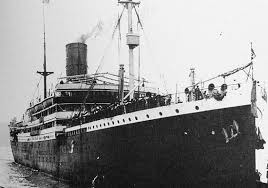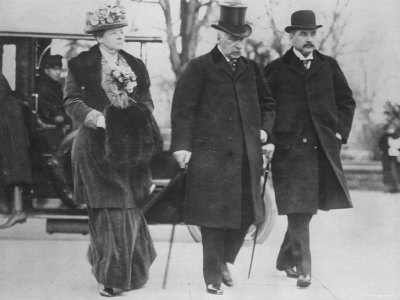More American Deaths in U-Boat Attack.
American Bankers Seek Huge Loan for Britain and France.
Special to The Great Project.
(4-7 November) The United States is struggling, unsuccessfully, to maintain President Woodrow Wilson’s policy of neutrality.
More Americans are killed in a German submarine attack on a passenger ship, prompting louder calls for the U.S. to retaliate.
At the same time, a bitter debate breaks out over a huge loan American bankers want to make to France and Britain.
On November 7th, a century ago, in the Mediterranean off Sardinia, an attack is underway, reports historian Martin Gilbert. “An Austrian submarine shelled and then torpedoed an Italian ocean liner, the Ancona, on its way to New York with many Italian immigrants on board.”
“Two-hundred-eight passengers were killed, including 25 Americans.”
Gilbert reports that “as with the previous German submarine sinkings….
…the American government protested, found the Austrian reply unsatisfactory, but took the matter no further.”
This attack, with the death of more American citizens, comes not long after a great debate breaks out in the Wilson administration over whether the neutrality policy of the United States permits American banks to lend Britain and France $500,000,000.
At the time, the fall of 1915, after long debate within and outside the Wilson administration, the United States comes to terms with the Allies. “It provided,” writes historian and Wilson biographer Arthur Link, “for a five-year unsecured loan of $500,000,000 to the British and French governments at an interest rate that totaled nearly six percent, with commissions and discounts, to be underwritten by a nation-wide banking syndicate headed by the Morgan firm.”
Public support in the U.S. for this loan is hardly unanimous. Many Americans, reports Link, “were disturbed by what they thought was the moral unneutrality of the loan.”
“I think it is getting the people of this country to gamble on the war,” declares William Jennings Bryan, Wilson’s former Secretary of State. “The Bible says in effect, ‘Where your treasure is, there your heart is also.’”
The American bankers of J.P. Morgan and Company intend to raise the sufficient funds for the loan by selling bonds to the American public.
But Morgan does not count on the opposition of the public. The bank fails to sell even half the necessary bonds.
“It was altogether a spectacular failure with momentous implications for the future,” observes Link. “For one thing, it convinced the American bankers and British financial leaders that it would be futile to try to raise any important sums directly from the American people.”
It put an end to any attempt by Britain and its American bankers to raise funds directly from the Americans.
Writes historian Link, “This in turn meant that the British would become totally dependent upon the good will of the American financial community and, ultimately, of the Washington government itself.”
The significance of this episode is not lost on the leaders of Imperial Germany. It sparks skepticism and anger in Germany about Washington’s “so-called” neutrality.
And it offers little incentive for the Germans to conduct its submarine warfare in a manner that would spare American citizens.
German military leaders see no reason to avoid killing Americans on the high seas as long as the U.S. is seen to lend money to the cash-strapped British and French governments.
The Germans see the loans as the only thing keeping the Allies — Britain, France, and Russian — in the war.


